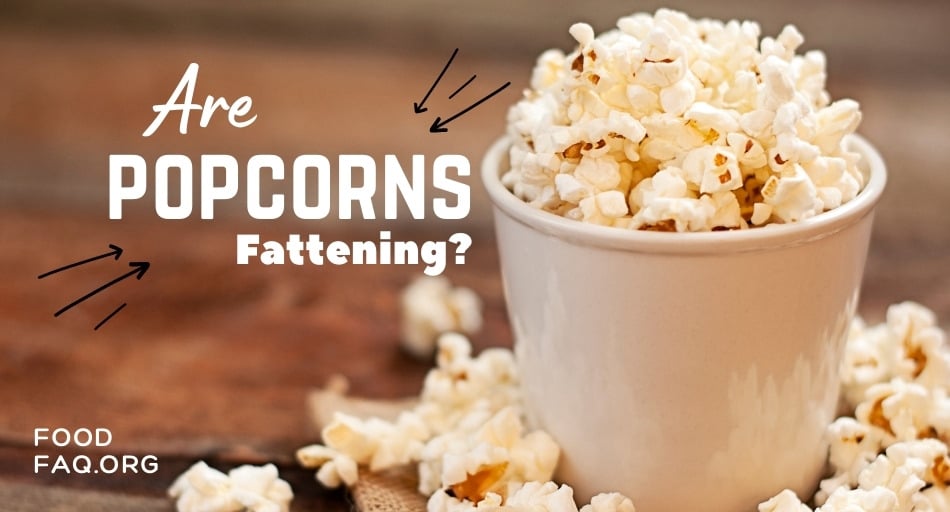Popcorn is one of the most popular snacks on the globe. It’s also considered to be quite healthy and loaded with nutrients as long as it’s air-popped.

Still, many people who follow a weight loss diet worry that eating popcorn may stall their progress and even make them gain more weight.
So, is popcorn fattening? Or can it be a healthy addition to a weight loss-friendly diet?
Table of Contents
Is popcorn fattening?
Provided it’s air-popped, popcorn contains very few calories, which means you can safely consume it on a low-calorie diet. It’s important to consume only air-popped popcorn if your goal is to lose weight as other varieties are high in fat and calories.
They’re also lower in essential nutrients, providing you with only empty calories.
Is popcorn high in calories?
A one-cup serving of air-popped popcorn contains just around 31 calories, most coming from carbohydrates, including fiber.
As a result, even if you were to eat more than this serving, you’d still be able to maintain a calorie deficit.
For this low number of calories, air-popped popcorn actually provides you with some good nutrients, including magnesium, phosphorus, and manganese.

If you’re making oil-popped popcorn, the calories are much higher and more come from fat. One cup of oil-popped popcorn contains approximately 64 calories.
It’s also much lower in fiber and higher in sodium. So, even if your goal isn’t weight loss, you might be better off eating air-popped popcorn.
There are also more varieties of popcorn available on the market. One of the most common ones is caramel-coated popcorn.
It does provide you with slightly more nutrients, such as vitamin K and iron, but it’s way higher in calories. Just one cup of this type of popcorn contains around 130 calories and a lot of sugar.
So, caramel popcorn should be avoided as much as possible on a weight loss-friendly diet.
Microwavable popcorn is slightly higher in calories than both air- and oil-popped versions of this snack.
Just one cup contains around 95 calories, mostly from fat and carbs. It tends to be much higher in fiber, and several other nutrients, such as thiamin, magnesium, zinc, and copper.
However, microwave-popped popcorn contains lots of vegetable oil and fat as well as sodium, making it a rather poor choice for a healthy weight loss diet.
Is popcorn good for you?
Popcorn is low in calories but still high in several important nutrients. One of the most abundant minerals found in popcorn is manganese.
This mineral helps your body form connective tissue, bones, blood-clotting factors, and sex hormones.

It also plays a crucial role in carb metabolism, calcium absorption (which popcorn also contains), and blood sugar regulation.
Because of that, popcorn can help you load up on this important mineral.
According to several studies, popcorn is also high in polyphenol antioxidants. These plant compounds have been linked to several health benefits, including better blood circulation, improved digestive health, and a reduced risk of various health conditions.
In addition, the polyphenols found in popcorn can lower your risk of prostate and breast cancer as long as you eat it as part of a healthy, balanced diet.
If you snack on popcorn, you can also increase your magnesium intake. This mineral is involved in hundreds of biochemical reactions in your body.
It’s incredibly important for the health of your immune system, as it has anti-inflammatory benefits.
Magnesium may also combat the symptoms of depression and anxiety when taken as a supplement, which can be a great benefit for many people.
While there are many benefits to eating popcorn, make sure to remember that some pre-packaged microwavable popcorn may be harmful to you.
This is because the bags the popcorn comes in are often lined with a specific chemical that has been linked with ADHD, low birth weight, and thyroid problems.
It may also contain artificial flavoring and other chemicals, so make sure to stick to regular loose popcorn kernels instead.
Should you eat popcorn if you want to lose weight?

Depending on the variety you choose, popcorn can be a great choice of snack for a low-calorie diet. Firstly, popcorn is high in fiber.
Most people consume more than one cup of popcorn in a single sitting, so you can easily reap up to 15 g of fiber from eating air-popped popcorn.
Fiber helps you feel full after eating as well as reduces your risk of heart disease, diabetes, and obesity.
As a result, eating popcorn as a snack can aid in your weight loss journey.
As a snack, popcorn is also very low in calories. When you compare how many calories you’re taking in from eating popcorn and other snacks like potato chips, you’ll notice that you can eat six times fewer calories but still feel satisfied when eating popcorn.
While this is impressive, remember that moderation is key, and you can still gain weight if you overdo it, especially when snacking on oil-popped or flavored popcorn.
What type of popcorn is best for a weight loss-friendly diet?
As mentioned, the best type of popcorn to go for if you want to avoid consuming unnecessary calories is air-popped.
It’s very low in calories, contains essential minerals, and provides you with a great serving of fiber.
Because of that, choosing popcorn as a snack instead of other, high-calorie foods can help you healthily lose weight.

However, if you do enjoy the taste of oil-popped popcorn, you don’t have to completely give it up.
Just make sure to make it yourself – that way, you’ll be able to control how much oil you’re adding.
You can also opt for butter or peanut butter instead, which will add nutrients while helping you feel fuller after eating.
But make sure to do so in moderation, as peanut butter is high in calories.
Conclusion
Popcorn, especially the air-popped kind, can be a great addition to a weight loss-friendly diet.
It’s low in calories, high in fiber, and very filling, which doesn’t make it fattening for you. In addition, it comes with some great health benefits.
So, as you can see, there’s no reason why you shouldn’t indulge in some air-popped popcorn every once in a while.
